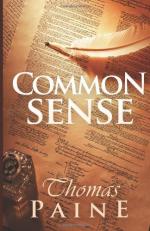|
This section contains 665 words (approx. 2 pages at 400 words per page) |

|
Common Sense, Rights of Man, and Other Essential Writings Summary & Study Guide Description
Common Sense, Rights of Man, and Other Essential Writings Summary & Study Guide includes comprehensive information and analysis to help you understand the book. This study guide contains the following sections:
This detailed literature summary also contains Topics for Discussion and a Free Quiz on Common Sense, Rights of Man, and Other Essential Writings by Thomas Paine.
Thomas Paine is one of the loudest voices of the American Revolution. The pamphlet Common Sense, written by Paine, was a controversial work supporting the American colonies' separation from England, advocating the formation of a new government. The work was published anonymously, however, and Paine never received a cent from its publication or subsequent reprints. Although anonymous, it became clear to many that Paine was the author due to the nature of the content as well as Paine's own history as a pamphleteer and outspoken radical.
Common Sense is an elaborate outline of the reasons America should be separate from England. Paine views the monarchy as absurd, claiming that heredity does not prove wisdom. Also, it is impractical to attempt to rule another country that is across an ocean. News would take months to reach the other side and it would be impossible to vote on or invoke new laws that affect both places. Finally, the author shows how America would best be served in the area of commerce if it were able to operate on its own and not be hindered by being tied to England.
In The Rights of Man, Parts I and II, Paine addresses the American, English, and French Constitutions. The work is mainly focused on the support of the French Revolution, using the victorious American Revolution as a reference of purpose and success. Paine was in favor of the Parisians' right to form a new government that would serve the people instead of the monarchy. It was not that the Parisians hated King Louis XVI, rather, the revolution was spurred by centuries of oppression and poverty. It is obvious that Paine was deeply affected by the time spent in Paris and that there was a great fondness between Paine and the Marquis de La Fayette.
Paine details several acts of the French Revolution, from the storming of the Bastille to the formation of a declaration devoted to the rights of man. In addition to Paine's long winded explanations of the errors of the English Constitution versus the American and French Constitutions, the author spends a great deal of time rebutting, and at times attacking, his former ally Edmund Burke.
Paine and Burke formed a strong friendship during the American Revolution and were thought to have the same views on government and democracy. When Burke stepped over to the side of the French monarchy, Paine was astonished and perhaps wounded on a personal level. Burke, whom Paine had admired, had now become an outspoken political opponent and critic of Paine's work. The feud between the two men seemed impossible to resolve and continued until the end.
In Age of Reason, Paine addressed religion. Although it is said to be a taboo subject among most civilized cultures, Paine puts forth his belief that religion is often used to distract people from their governments, that the mystery of religion is often used to control its people. Also, Paine seems to take delight in critiquing the fable of Creationism, pointing out absurdities and astonishment that people would be willing and eager to believe such a fantastic tale. The result is a work that is both amusing and enlightening to the reader.
Agragarian Justice is a short work advocating the payment of property ownership. Paine believes that in a natural state, all people are born owning a piece of the earth or at least the use of said land. In a civilized state, this is not possible due to the limits on the amount of land versus the number of people in the population. The author's concern is that civilization, while advantageous in many ways, may impoverish and weaken society.
Overall, the Essential Writings of Thomas Paine has been collected into a volume which clearly expresses Paine's views on a number of subjects and gives the reader a true glimpse into the man's belief system. Although some of the work, particularly the Rights of Man, is incredibly long, drawn out and repetitive, there is no mistaking where Thomas Paine stands.
Read more from the Study Guide
|
This section contains 665 words (approx. 2 pages at 400 words per page) |

|



